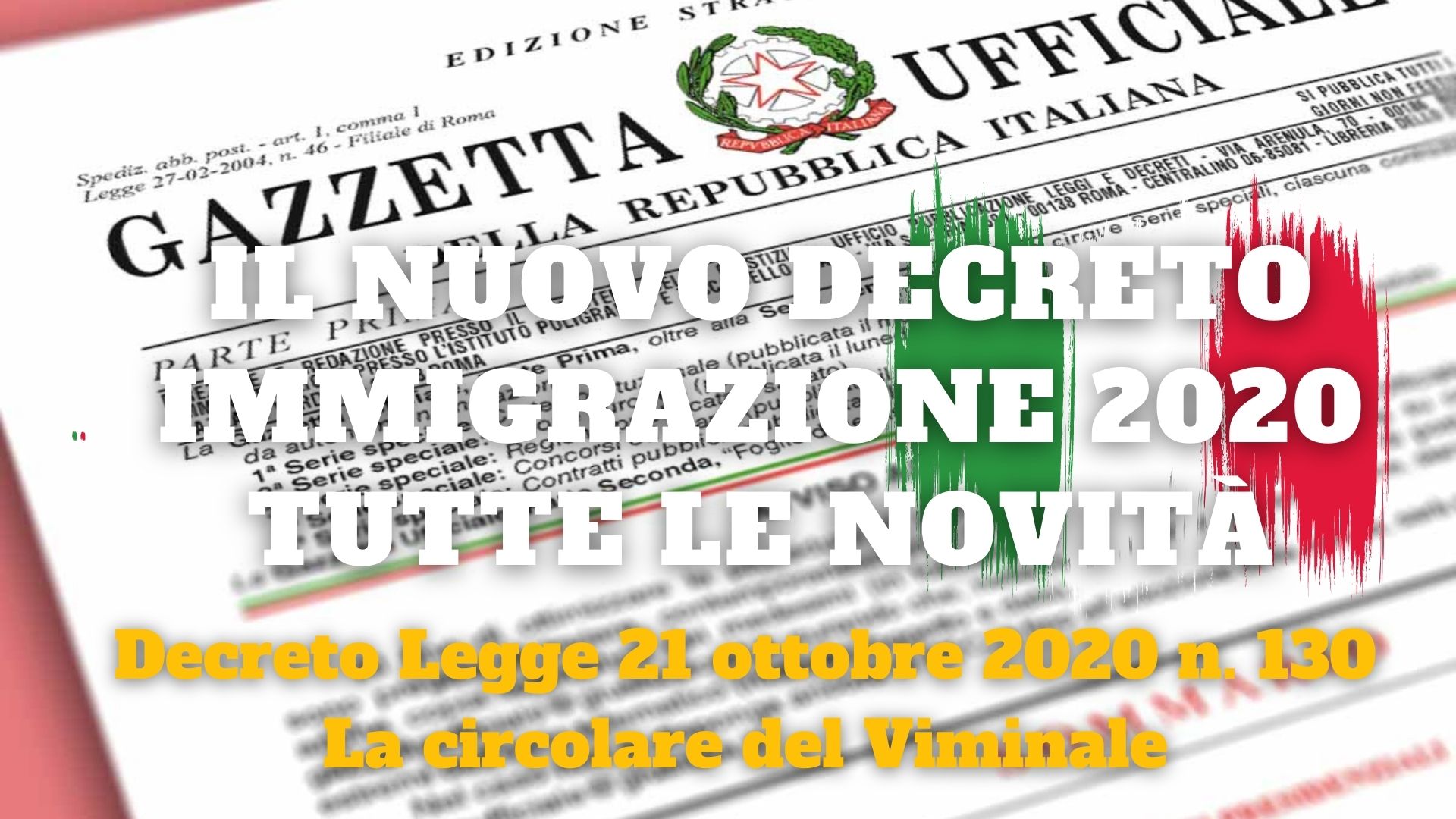In Bukavu, a woman protests in the streets against the authorities; the police shoot and…

Special on Migrants. What is Foreseen with the Immigration Security Decree of Cosa Published on 21 October 2020
- A new ‘immigration-security decree’, approved by the Conte II government, has been in force since 22 October 2020. It is the decree-law of 21 October 2020, n. 130, containing ” Urgent provisions on immigration, international and complementary protection, amendments to articles 131-bis, 391-bis, 391-ter and 588 of the criminal code, as well as measures regarding the prohibition of access to public establishments and premises of public detention, of contrasting the distorted use of the web and of the regulation of the National Guarantor of the rights of persons deprived of personal freedom “.
The reasons of necessity and urgency that legitimize the use of the decree-law pursuant to art. 77 of the Constitution were identified as the no longer postponable need to clarify some profiles of the previous security decrees ( Legislative Decree 4 October 2018, No. 113 and Legislative Decree 14 June 2019, No. 53 ) – dating back to the Conte I Government (when Minister of the Interior was Matteo Salvini) – through their remodeling that took into account the constitutional and international principles in force on the subject, as well as some functional aspects that had generated application difficulties.As noted in the explanatory report, the new regulatory intervention, although strongly advocated by a part of the political forces, responds above all to the objective need to follow up on some observations made by the President of the Republic in the first instance of the issue of Legislative Decree 113/2018 and then the promulgation of the l. 77/2019 , of conversion into law of Legislative Decree 53/2019.
- With an overall look – except to dwell more closely below on the most relevant changes – the sixteen articles of the decreemodify the current legislation on the legal status of the alien (requirements for the issuance of the residence permit and convertibility of the same in work permits) , international protection and reception system , ban on the transit of ships in the territorial sea , administrative detention of foreigners and attribute the unprecedented role of the Guarantor of the rights of persons deprived of personal freedom as a complaint body for living conditions inside migrant detention centers.
Of immediate criminal relevance, however, are the changes regarding the inapplicability of the cause of non-punishment pursuant to art. 131 bis of the Criminal Code, the new provisions on communications in prison(with the modification of the offense of facilitation pursuant to art.391 bis and the introduction of the crime of undue access to devices suitable for communicating detainees pursuant to the new art.391 ter ), the tightening of sanctions for the fight , the changes to the so-called “urban DASPO”, the contrast to the commission through internet of drug offenses.
- Amendments to the penal code (articles 131 bis, 391 bis, 391 ter, 588 of the criminal code).
3.1. Starting from the changes affecting the penal code, art. 7 of the decree intervenes on the text of art. 131 bis co. 2 , second sentence of the penal code, restricting the cases of exclusion of the cause of non-punishment . In 2019, by the cd. security decree bis, the second paragraph of art. 131 bis of the Criminal Code had been the subject of an amendment that had inserted the following sentence: ” The offense cannot also be considered particularly tenuous when proceeding for crimes, punished with a penalty exceeding a maximum of two years and six months of imprisonment, committed during or due to sporting events“. Subsequently, art. 1, paragraph 1 of the l. 8 August 2019, n. 77, in the conversion of the aforementioned decree, had added the following words: “, or in the cases referred to in articles 336, 337 and 341 bis, when the crime is committed against a public official in the exercise of their functions.
Now, the decree in question intervenes again on this paragraph, circumscribing the cases of exclusion of the cause of non-punishment that is now applicable to the criminally relevant conduct directed against an officer or public security agent or an officer or judicial police officer in the exercise of their functions (less broad definition than the previous one which, it should be remembered, referred to a public official in the exercise of their functions).
At the same time, however, the novella adds a new hypothesis of exclusion from the applicability of 131 bis ,providing that an offense can no longer be considered particularly tenuous in the event of an offense against a magistrate at a hearing (art. 343 of the criminal code).
In this regard, it should be noted that with the order of 5 February 2020, no. 93, the Court of Turin raised a question of the constitutional legitimacy of art. 131 bis c. 2 of the Criminal Code – as amended by the bissecurity decree – by contrast with Articles 3, 27 co. 3 and 117 co. 1 of the Constitution in relation to art. 49 co. 3 of the Charter of Fundamental Rights of the European Union in the part in which it excludes that the offense can be considered particularly tenuous , among other things, in the cases referred to in art. 337 of the Criminal Code , when the offense is committed against a public official in the exercise of his or her duties. Among the various reasons given [1], The Court highlighted, in particular, an unreasonableness profile in the decision to exclude a priori the possibility of a tenuous nature for insulting a public officer ( ex art. 341 bis cp) but to consider instead apply the 131 bis to the facts of outrage against a political, administrative or judicial body ( pursuant to Article 342 of the Criminal Code) or to outrage against a magistrate in a hearing ( pursuant to Article 343 of the Criminal Code).
Now, if the latest intervention by the legislator also included art. 343 of the Criminal Code in the event of inapplicability of the cause of non-punishment, the other issues raised with reference to art. 337 – remained undamaged from any modification – for which it will therefore have to await the ruling of the Constitutional Court.
3.2. In the wake of the increase in the number of mobile phone cases found inside prisons [2] , articles 8 and 9 of the decree in question redefine and tighten the discipline of abusive communications with the outside of prisoners . First of all, art. 8 of Decree amends ‘ art. 391 bis of the Criminal Code (now titled: Facilitation of communications by prisoners subject to the restrictions referred to in Article 41 bis of Law No. 354 of 26 July 1975. Communications in circumvention of the provisions ) in three points. The first two concern an increase in penaltiesalready provided for those who facilitate external communication of prisoners subjected to the strict regime of art. 41 bis ord. pen. (the original sentence from 1 to 4 years is now increased from 2 to 6 years of imprisonment ) and for the same conducts carried out by a public official or a lawyer , now punished with imprisonment from 3 to 7 years (in previously the editorial framework was from 2 to 6 years). The third amendment, finally, adds a third paragraph to the case that from today therefore sanctions with the penalty from 2 to 6 years also the prisoner in 41 biswho communicates with others in circumvention of the requirements imposed. Moreover, one could question the real need for such changes given that the law – inserted by the legislator with l. 15 July 2009, n. 94 (the so-called safety package ) – in eleven years of life it appears to be substantially devoid of practical applications [3] .
The art. 9 of the decree, on the other hand, introduces the new art. 391 ter c.p. the case of improper access to devices suitable for communication by detainees . The new incriminating law provides that – apart from the cases referred to in the previous article – anyone who procures a prison term from 1 to 4 years ( or from 2 to 5 years in the case of a public official or a lawyer ) prisoner (even not under the 41 bis) a mobile phone or any device suitable for making communications or, more simply, allows the improper use of such tools or, again, introduces one of the aforementioned tools into a prison in order to make it available to a detainee. Symmetrically, the penalty of imprisonment from 1 to 4 years , unless the fact constitutes a more serious crime, will also apply to the prisoner who unduly receives or uses these tools, until now subject to a mere disciplinary offense.
3.3. The modification made by art. 10 of the provision in question, to the crime of brawl pursuant to art. 588 cp. In response to the “resurgence of criminal phenomena” (the reference is probably to the sad story of Willy Duarte), the decree revises the legal framework of the crime, raising the maximum legal limit of the fine to the first paragraph (from 309) to 2000 euros for those who participate. In the second paragraph, which governs the hypothesis in which during the brawl someone is killed or sustains personal injury, the legal framework of the imprisonment for the participants – previously set between three months and five years – is now raised and included in six months and six years.
- Changes in immigration.
4.1. Six of the sixteen articles of which the decree-law is composed intervene in the matter of immigration by making changes to the legislative decree 25 July 1998, n. 286 (Consolidated law on immigration, hereinafter tuimm.), to legislative decree 18 July 2015, n. 142 (implementing Directive 2013/33 / EU laying down standards for the reception of applicants for international protection and Directive 2013/32 / EU on common procedures for granting and withdrawing the status of international protection.) And d.lgs. 28 January 2008, n. 25(implementation of Directive 2005/85 / EC laying down minimum standards for the procedures applied in the Member States for the purpose of recognizing and withdrawing refugee status).
Although this is not the place for a complete examination of the changes to the immigration regulations, it seems appropriate to highlight the most relevant interventions, both for their media coverage and for their location in a ‘gray area’ on the border between administrative law and criminal law.
4.2. The art. 1 of the decree-law in question says provisions regarding residence permits and border controls. If the Legislative Decree 113/2018 began with the abrogation of the residence permit for humanitarian reasons, today’s decree opens with the reintegration – in art. 5 co. 6 tuimm. – the mention of compliance with the constitutional or international obligations of the Italian State , eliminated by Legislative Decree 113/2018.
By inserting the new paragraph 1 bis in art. 6 tuimm . the decree also provides for a list of types of residence permit for which conversion into a residence permit for work reasons is allowed under certain conditions [4] .
4.3. In terms of border controls, the decree intervenes on the discussed prohibition of entry, transit and parking of ships in the territorial sea, introduced by the 2019 bis security decree and which, on several occasions, had resulted in the prolonged stalemate of dozens of migrants on board of NGO ships.
By art. 1 co. 1 letter c and d , are therefore abrogated: paragraph 1 ter of art. 11 (which assigned to the Minister of the Interior the power to limit or prohibit the entry, transit or parking of ships in the territorial sea ) and paragraphs 6 bis , 6 ter and 6 quater of art. 12 (which provided for the heavy administrative fines – from 150,000 to 1,000,000 euros – and the confiscation of ships, in the event of violation of the prohibitions set forth pursuant to art. 11 co. 1 ter ).
Although remodeled and expelled from the tuimm., However, both the ban on transit and parking survive (no longer talking about entry, instead) and their sanction which, by virtue of the applicability of art. 1102 cod. nav., becomes a penalty. The art. 1 co. 2 of the decree-law, in fact, provides that, without prejudice to the provisions of article 83 of the Navigation Code [5] , for the same reasons and in the same cases until yesterday provided for by art. 11 co. 1 ter tuimm. [6] , the Minister of the Interior, in agreement with the Minister of Defense and the Minister of Infrastructure and Transport – after informing the President of the Council of Ministers – may (still) limit or prohibit the transit and parking of ships in the territorial sea, except in the case of military or non-commercial government service ships.
An important novelty introduced by the decree is the provision that these provisions do not apply to rescue operations immediately communicated to the coordination center responsible for maritime rescue and to the flag State, carried out in compliance, on the one hand, with the indications given by the authority responsible for search and rescue at sea and, on the other hand, for international obligations regarding the law of the sea and the rights of refugees [7] .
In the event of non-compliance with the aforementioned prohibitions – the exorbitant administrative penalties previously provided for and, in particular, the provision of the extent of the confiscation of ships removed – will apply Article 1102 of the Navigation Code [8] , which imposes the penalty of imprisonment up to two years , as well as a fine of between € 10,000 and € 50,000 .
4.4. The interventions in paragraphs 1.1., 1.2 confirm the renewed desire to respect international obligations. and 2 of art. 19 tuimm. on the subject of bans on expulsion and refoulement.
In particular, pursuant to the new art. 19 co. 1.1. , the refoulement, expulsion or extradition of a person to a State is not allowed if there are good reasons to believe that he or she risks being subjected – no longer only – to torture but now also to inhuman or degrading treatment ( art. 3 ECHR ) or even when there is reason to believe that removal from the national territory involves a violation of the right to respect for one’s private and family life ( art. 8 ECHR ) [9], unless it is necessary for reasons of national security or public order and security (thus having to take into account the nature and effectiveness of the family ties of the person concerned, his effective social integration in Italy, the duration of his stay as well as the existence of family, cultural or social ties in the country of origin).
In addition, pursuant to the new paragraph 1.2. of the art. 19, using these assumptions of prohibition refoulement and being already rejected the application for international protection, the Territorial Commission will transmit the documents at the District to issue a residence permit for special protection (thereby effectively restoring permission to stay for humanitarian reasons). The amendment to art. 19 paragraph 2 , on the other hand, extends the prohibition of refoulement (previously envisaged for foreigners in particularly serious health conditions) also to foreigners suffering from pathologies relating to the psychiatric sphere .
The art. 2 of the decree sets out provisions on the procedure for the recognition of international protection, affecting the legislative decree of 28 January 2008, n. 25 and rewriting the discipline of the priority examination and the accelerated procedure , as well as the powers of the territorial commissions.
4.5. Of particular interest is art. 3 of the decree-law, which makes some changes regarding the administrative detention of foreigners, a measure often object of attention also by criminal lawyers (as well as by the Guarantor of persons deprived of liberty) for the affinity – in substance, but not in guarantees – with the deprivation of freedom of criminal origin.
Recently, in Milan, the issue has also been the subject of debate by public opinion due to the reopening, amid protests, of the CPR in via Corelli [10] , which in the past had often been talked about for suicides, violence and abuse [11] .
Firstly, the decree-law adds to art. 10 ter co. 3 tuimm. – article inserted in 2017 by the cd. Minniti decree and which, for the first time, had named the hotspots in a source of primary rank and provided with an (apparent) regulatory basis [12] – the provision that the foreigner, who is detained in a CPR following the refusal repeatedly to undergo the photodactyloscopic surveys, is promptly informed of the rights and faculties deriving from the procedure for validating the detention decree in a language he knows .
By inserting a reference to art. 14 , is then equated (in forms) with detention in the CPR, the deprivation of liberty that occurs – pursuant to art. 13 co. 5 bis – in (not better defined) different and suitable structures in the availability of the Public Security Authority or in suitable premises at the border office if the detention pending the validation of the judge on the expulsion measure cannot take place in a CPR due to lack of available places.
Five are the changes made to art. 14 tuimm, cornerstone of the entire administrative detention system.
The first amendment provides for a procedure for identifying the CPR to which to transfer the alien who is the recipient of an expulsion order that cannot be carried out immediately, instructing the commissioner to make a specific request to the Central Directorate of Immigration and the Border Police of the Department of Public Security of the Ministry of the Interior.
The second amendment introduces, in the event of a shortage of places, a priority detention mechanism that gives priority to those who are considered a threat to public order and security or who have been convicted, even with a non-final sentence, the offenses referred to in art. 4 co. 3, third period and art. 5 co. 5 bis (the same conditions preventing the issuance of a visa and residence permit), as well as for those who are citizens of (or who, more simply, come from) third countries with which cooperation agreements or other arrangements are in force repatriation.





